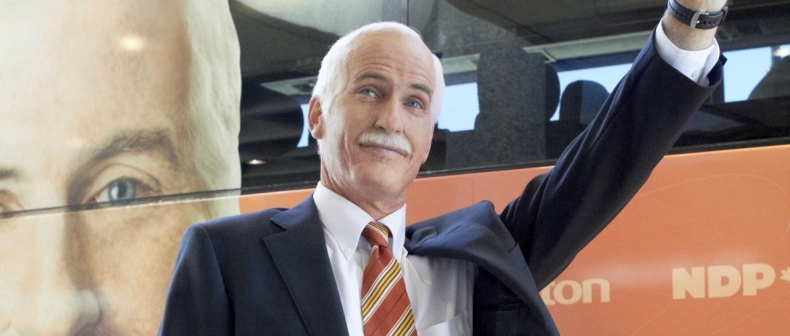
Rick Roberts as Jack Layton. All images courtesy of CBC
Before seeing the film Jack, I sat down with Rick Roberts, the actor playing Jack Layton, Sook-Yin Lee, who plays Olivia Chow, the film’s producer Laszlo Barna, and, a woman who needs no introduction, Olivia Chow. I have greatly condensed the interviews because verbatim was way too long.
Sook-Yin Lee
Sook-Yin Lee as Olivia Chow
When portraying fictional characters you have leeway to interpret. What sources did you consult to build your understanding of Olivia Chow?
The source material is alive and well and sitting right beside me. Olivia. And I sought out some of her friends, Nancy Tong, who was her best friend growing up, in Toronto they went to U of T together. Nancy is a documentary film maker living in NYC, and she knew Olivia when Olivia was studying philosophy. Older high school friends too.
I was going to ask next whether you felt licensed to interpret…
Olivia was very much open to our interpretation of it. It’s never an impersonation, it’s always an interpretation. It’s an amalgam of mythological reality and self.
You’ve said that your childhoods have overlapped, that in both cases there was domestic abuse, you described as “tumultuous,” you both moved to the arts, and you both defied your Chinese-Canadian parents to do that. Did any of that go into your portrayal?
Ya, it’s huge. I was at first, “gosh, where are my similarities to Olivia?” I thought we were very different people. But the more I spoke to her and found out about her, I started to identify. She pursued art, went to art school, studied philosophy… that doesn’t really go over well [with many immigrant parents]. I ended up leaving home when I was 15 and I joined a rock and roll band. I can recognize in Olivia a tenacity and spunk and survivor quality that I as well share. She’s a harder partier than I am [laughter].
Oh yeah?
Yes! She and I have very similar experiences on very fundamental and important places of a young adult.
In past works you’ve explicitly and overtly dealt with love and sex. Is it different when you’re portraying a younger woman who is awkward and anonymous versus a federal politician?
I tell love stories. My work is often about love, and the challenges it presents, so I felt there’s a real strong kind of connection between these projects. The bedroom is a boxing ring, or can be, there’s not as much sex certainly in this film, compared to Shortbus or Year of the Carnivore, but what they do share at their heart and what is fundamental at the core of each of those films is human dynamic, and the tenderness and challenges and difficulties that come with matters of the heart. Everybody grapples with that.
Olivia Chow
Jack Layton and Olivia Chow, Trekkies
You’re a public figure obviously, but does such a public personal portrayal make you uncomfortable?
No.
I mean you’re a politician, everyone knows your face and who you are. But the personal, the love aspect…
It’s worthy of celebration, why not?
Fair enough! Jack was famously pictured at a Star Trek convention with a custom made uniform. Very modestly, he had no rank insignia on the collar.
No, no, he was a worker!
Do you think the show influenced his politics or worldview at all?
You know…Star Trek always talks about mediation. You compromise in order to get things done, to accomplish something. Jack would rather get things done, and he once said that it’s much easier to get things done when you don’t need to claim credit. Tommy Douglas never claimed credit on health care, he wasn’t the Prime Minister.
Jean Luc Picard took the credit.
That’s true, but he is the captain. Jack was the captain of the New Democratic Party of Canada, he was the leader, but it’s always a team approach. You’re only as strong as your team members.
You gotta know the fleet! You watched the show?
Oh yeah! I’ve seen every single one.
The philosophy is beautiful, civilized and peace loving…
When Jack became the leader, it wasn’t clear whether Canada was going to join in the invasion of Iraq, he as a new leader, during his honeymoon period, put in everything he had to push the Prime Minister – at the time Chretien – to say, “no, you do not want to make that mistake.”
You visited the Winnipeg film set. Did you make any recommendations or impact the film in any way?
Yeah, I told them that media interviews, scrums, would have been a lot more aggressive. While they were doing that scene the media was very nice and polite…
Oh no, we’re hounds! [laughter]
Exactly! [Laughs] I didn’t use that word, but I said, “They wouldn’t have been this gentle…”
When we smell blood…
This was when he said he’s not going to support the budget, and the government was going to fall, triggering a general election. You’re not going to say, “Why did you do that, Mr. Layton?”
Jack’s story begs to be told, it’s so compelling. But it’s also good for the NDP. What do you say to people who accuse you of exploiting the compelling human story for party politics?
This film didn’t hammer people on the party. It wasn’t about the NDP. If there’s one message there, it’s get engaged politically to make a difference, to try to make a change. Make your society, your city, your country a better place to be. However you think! I believe there’s a scene in there, the nurse said to Jack, “it’s so wonderful to help you, serve you.” And I think he said, “I’m an ordinary person, I’m no different than anybody. An ordinary person can do what I do.” So it’s really trying to say he’s not a big deal! He’s just an ordinary guy. He’s semi-famous because he’s the leader. When you become the leader you get known. The intention of the film: ordinary guy who did what he could, believed in optimism, very loving person wanting people to go out also and make a difference. That’s a non-partisan message.
Rick Roberts
Rick Roberts as Jack Layton
Did your political views of Jack Layton, one way or the other, influence the way you portrayed him?
No, the personal story that goes with that is the actual drama. I agree with a lot of the stuff he stood for… AIDS, and homelessness [against these things, of course]. The love story with Olivia, and the tragedy of a guy who always hoped and strove for the best, to make a difference… we’re all overtaken, but he did it in a very public way in a particular time that almost reads like a strange sorta fairy tale…you look at it and go, “Holy shit, it’s not real!”
It would be too cliché…
The kind of thing that if it didn’t actually happen, you’d go, “come on, literally that quickly? Then?”
Everybody said, even if you disagreed with him he’s the leader you’d rather have a beer with.
Yeah, he’s the leader they like. People I know say, “Great guy, but I’d never vote for him.”
To prepare for the role of Jack you had to learn some French, some Cantonese, get in better shape, and learn some guitar. Are you grateful to the memory of Jack Layton for making you a better version of yourself? [Laughter]
I absolutely am! [Laughs] I’m not an athlete… just going through a few months of physical exercise, was transformative.
What was the hardest thing about trying to look like Jack Layton?
Two hours of makeup. Doug Morrow devised the prosthetics that I wore, and he is an artist sculptor. The hard part for me was practicing how to get his voice, his physicality at home alone, not looking like him. It’s hard to know. You feel ludicrous because I don’t resemble him. But when we were doing the makeup tests just before we started shooting when I got to Winnipeg, then I felt all the work I had done come together with the makeup that Doug had created. That was pretty thrilling.
They got the moustache exactly right, the same number of follicles?
I was walking down the street in Winnipeg and people in the street would do double takes…there were a couple of guys, I walked past and someone said, “I thought that guy died?”
Laszlo Barna
Your production company, Pier 21 Films, has portrayed not just different Canadian personalities but opposites–David Suzuki, Don Cherry, and now Jack Layton. Is there a difference in the process when the subjects are so different?
No. I like to do movies about people everybody knows. When you get in a cab, the driver asks what you’re working on, you say, “the Suzuki movie,” or “Don Cherry.” They want to know more. Its access to subject and hopefully portrays a side of the subjects no one knows. With Jack, everyone got a little frightened because he was a healthy man, a strong man in May and June, and he was on death’s doorstep three months later. That’s a universal story.
Sometimes reality is exaggerated when depicted in film. Does Jack have any Argo embellishments? Does Jack Layton rescue hostages from terrorists? [Laughter]
No. To be honest it was dramatic enough the way it was, we didn’t have to invent anything. It would have been much better if we had some shootouts [laughter].
Those got nixed at the last minute.
If you stick to the truth it’s more interesting. You compress facts. It’s a very punishing medium. You have to tell a life story in 84 minutes. That’s hard. But it was essentially facts.
It was well known that Layton was a Toronto city councillor, but is he depicted as a professor at York, Ryerson and U of T?
We touch on him being professor-like, that transition from intellectual. In an ivory tower from working in the trenches, where everyone else lives. We don’t actually show him in the classroom.
People would be surprised to know he was so academic, he’s known for being so folksy.
Again, we had to decide how many events to cover. By the way, he went to McGill when I went to McGill. He was exactly my age, same generation.
Did you know him at all?
I knew him indirectly. He was in political science. I was doing theatre. Finally now our worlds collide!
The movie was first called Smiling Jack, now it’s called Jack. What would you say to critics who claim the CBC is deifying Jack Layton?
If we’re deifying, then we’ve failed as a movie. It’s that simple. We’re trying to portray Jack in his last year, and Jack as he matured into a politician. We tried to make it complicated for the viewer…we don’t put anyone on a pedestal, including Don Cherry! [Laughter]
He’s a pretty easy person not to have on a pedestal.
What we want to do is capture his humanity. And do it in such a way so that an hour and a half of television is informative and entertaining, because an audience is not going to put up with a very bland superficial portrait, or political, whatever it is.
From the CBC’s perspective, how can you not make a movie about that?
[CBC Executive] Kristen Stewart said, “I want you to do it because I saw what the public response was.” Stewart is in the business of getting audiences, and she has a mandate to do Canadian. The genesis of the film was they saw the public response to his death, it was overwhelming. Well…duh.
Post-script
Six hours after my last interview, I attended the gala opening of Jack. At times the film was moving, funny, and charming. But overall the script didn’t depart from the view of Layton held by a swooning 22-year-old Quebec undergrad. Chow and others claim that the one message to take away from Jack is anybody can get involved with the community, be hopeful, and make a difference. This message is there, yes, but nobody is walking away from the film inspired to become an activist for austerity.
Whatever you thought of the NDP in 2011, for decades Layton did stand firmly against homophobia, AIDS and homelessness at a time when to do so was uncommon and unpopular. I don’t mean to diminish the man himself. The film’s portrayal of him is relentlessly simple, but it’s not false. Only let’s not pretend the movie isn’t political too–I think Layton even says in the film that his personal beliefs are inseparable from his politics. They’re inextricable. As such, calling Jack a love story and not a political movie is a half-truth.
The actors in Jack were very likeable, the budget was small, the heart was big, and the message was optimistic. In short, it was pretty much a cinematic version of the NDP itself.
Jack airs Sunday March 10 at 8 pm on CBC.
____
Jeff Halperin is a Toronto-based writer. You can follow him on Twitter @JDhalperin.
For more, follow us on Twitter @TorontoStandard and subscribe to our newsletter.














